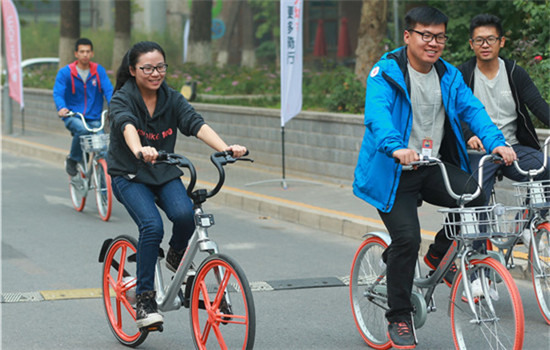
Employees of Beijing Mobike Technology Co ride the Mobike Lite, the latest addition to the company's bike-sharing services, in the Haidian district of Beijing. (Photo by ZOU HONG/CHINA DAILY)
New privately operated bike-sharing programs are hoping to reignite the public's love of two-wheeled travel.
In the years before the opening-up and reform policy that resulted in China becoming the world's second-largest economy, the main mode of transportation was the bicycle, and footage of millions of people riding on the roads of major cities led many outsiders to refer to the country as the "Kingdom of Bicycles".
As economic growth provided better wages and higher standards of living, cars overtook bikes as the most popular form of transportation. The country is now the world's largest auto market, but the downside is that roads are gridlocked, leading to longer journey times, and air pollution has become a pressing problem.
Now, new bike-sharing programs are hoping to reinvigorate the nation's love affair with the bike, reduce pollution, prevent snarl-ups, slash commuting times and help people to live healthier lives.
A new twist
Public bike-sharing is not new in China. As the number of vehicles on the nation's roads began to soar in the mid-2000s, academics and urban planners began calling for greater use of public transportation, and municipal governments began investing in affordable bike-sharing projects. Beijing launched its program in 2011, and now has 800 rental stations with about 50,000 bikes. Wuhan, Hubei province, and Hangzhou, Zhejiang province, have the highest numbers of public bikes in the world, with 90,000 and 60,000 respectively.
However, users frequently complain about the time-consuming application process and the inconvenience of locating bicycle hubs.
"When government-sponsored public bikes showed up on Beijing's streets, I used them. But I lost my metro card, which contained my deposit and registration information, and it was so hard to get a new one that I stopped using the bikes," said Wu Xiaohui, a 23-year-old dancer in Beijing.
Wu's words struck a chord with Zhang Hui, a magazine editor in Shanghai, who has recently started using Mobikes, a privately owned bike-sharing system: "I have used (government-operated) public bikes, but they are not user friendly. At first, I didn't care for Mobikes, but I saw a growing number of people riding them and the stylish shape attracted me. I was curious and thought I would try it."
Registration was easy. "There's no metro card or bureaucracy. As long as you have a smartphone and a deposit of 299 yuan ($44), you're good to go," the 29-year-old said.
She recommended the service to her family and friends because it provides a cheap, convenient form of transportation-a 30-minute ride costs about 1 yuan.
"I don't need to pick up or return the bike at a specific station. Instead, I can pick up and drop off in any public space as long as parking is allowed there," she said.


















































